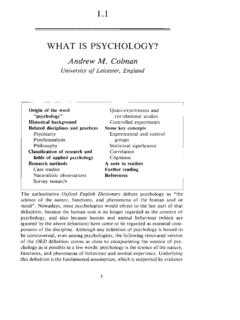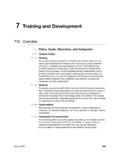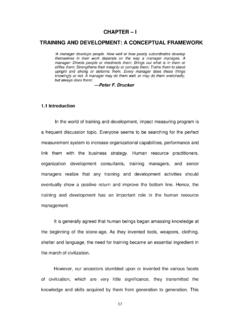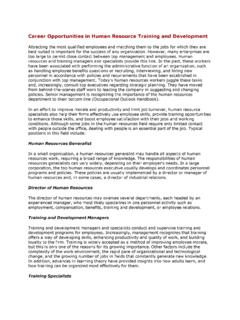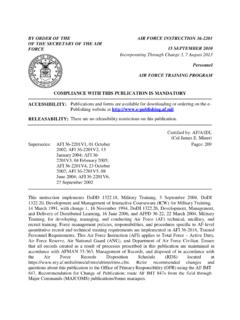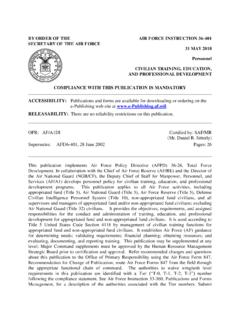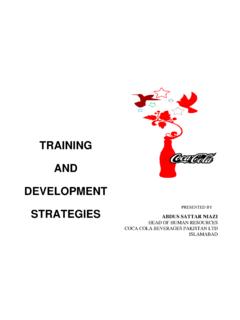Transcription of Training and Development (T & D): Introduction …
1 Training and Development (T & D): Introduction and Overview Recommended textbook. Goldstein I. L. & Ford K. (2002) Training in Organizations: Needs assessment, Development and Evaluation (4th Edn.). Belmont: Wadsworth. Aims and objectives Relate concepts and principles from the psychology of Training and Development to real occupational issues in order to make a constructive contribution to organisations. Recognize the psychological assumptions made in making Training and Development decisions and to manage these assumptions appropriately.
2 Appreciate the contextual factors of real organisations and work situations that affect decisions concerning the application of Training and Development concepts. Provide a basis for making useful Training interventions within organisations and evaluating such interventions. In doing these things, this learning material aims to enable students to develop appropriate understanding of using occupational psychology within organisations with respect to issues of Training and Development . Introduction Training and Development play an important role in the effectiveness of organisations and to the experiences of people in work.
3 Training has implications for productivity, health and safety at work and personal Development . All organisations employing people need to train and develop their staff. Most organisations are cognisant of this requirement and invest effort and other resources in Training and Development . Such investment can take the form of employing specialist Training and Development staff and paying salaries to staff undergoing Training and Development . Investment in Training and Development entails obtaining and maintaining space and equipment.
4 It also means that operational personnel, employed in the organisation s main business functions, such as production, maintenance, sales, marketing and management support, must also direct their attention and effort from time to time towards supporting Training Development and delivery. This means they are required to give less attention to activities that are obviously more productive in terms of the organisation s main business. However, investment in Training and Development is generally regarded as good management practice to maintain appropriate expertise now and in the future.
5 The relevance of occupational psychology to Training and Development Contributing to Training has long been one of the main concerns of occupational psychology this is not surprising given that Training involves learning and that learning is a central issue in psychology. Training is one of the core skills of occupational psychology. People with qualifications in and experience of occupational psychology have been employed in different capacities in Training and Development roles in government organisations, private companies and consultancy groups.
6 The discipline offers many benefits and perspectives to help resolve Training issues and problems and has also been at the root of many methods and techniques that have now become part of the routine practices within human resource management. Training specialists must be alert to the wider issues regarding the problems presented to them and need the skills and confidence to deal with them. They must understand how Training fits into the wider organisational context. An occupational psychology perspective is extremely beneficial in helping the practitioner to understand how Training relates to other interventions aimed at improving job performance.
7 Opportunities of employment in Training and Development Governments have traditionally played a significant role in the promotion and Development of occupational psychology with regard to Training , because of their responsibilities for employment, military, health and other services. People with an occupational psychology background have been employed directly by governments in areas such as job Training , military Training and health and safety. Government agencies have also been a major sponsor of Training research and Development ; such investment has often provided the major underpinning of developments in this area.
8 Governments can also affect the impetus for change in organisations through legislation, taxation, and the general health of the economy, which in turn can create more disposable income to create new demands for products and services, affect the supply of raw materials and services, or put such pressure on consumers that markets are adversely affected. Also, government initiatives can affect health and safety requirements, fiscal issues, competition laws, and ecological concerns, working with new technology and employment practices.
9 Such changes prompt new ways of organising and delivering these products and services, creating new Training needs. The other major source of employment and funding in Training and Development , where occupational psychology plays a specialist role, is private companies. Specialists might be employed directly within an organisation s Training and Development functions or in consultancy offering services to clients. Organisations often employ their own specialist Training and Development staff who have been recruited from the organisation s own ranks.
10 Organisations often prefer this approach because they feel it is more appropriate for their Training staff to have operational and business experience than for them to be experts in Training or occupational psychology. It is often assumed that Training is simply a matter of following well-established procedures and principles. This is an ill-informed view because often Training cannot always proceed simply by application of standard methods. It is often necessary to understand variations that have not been responsive to the standard procedures.


